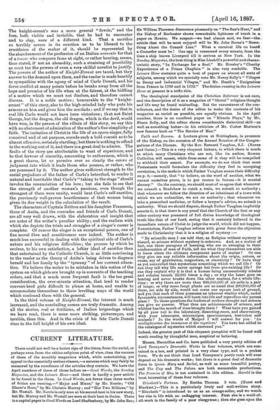CURRENT LITERATURE.
There could not well be a better sign of the times, from the social, or perhaps even from the ethicereligions point of view, than the success of those of the monthly magazines which, while entertaining, yet appeal to the essentially serious classes,—a success which may fairly be measured by the excellence of the articles they contain. We have the April numbers of three of these before us—Good Words, the Sunday Magazine, and the Leisure Hour—and there is hardly a poor article to be found in the three. In Good Words, not fewer than three works of fiction are ranning,—" Major and Minor," by Mr. Norris ; "Old Blazer's Hero," by Mr. Christie Murray ; and "Her Two Millions," by Mr. Westall. Mr. Norris is only seen at his second-beat in his new story, but Mr. Murray and Mr. Westall are seen at their best in theirs. There is a capital paper in Good Words on Lord Shaftesbury, by Mr. John Rae; Sir William Thomson discourses pleasantly on " The Sun's Heat," and the Bishop of Rochester shows remarkable lightness of touch in a paper on Mexico. We suspect—we hart almost said, we fear—the article that will be most enjoyed will be Mr. John Burns's " Some. thing About the Canard Line." What a carnival life on board a Conarder must be ! One egg is consumed every minute, from the time a ship leaves Liverpool till it arrives at New York. In the Sunday Magazine, the best thing is Miss Linekill's poundal and charao- teriatio story, "In Exchange for a Soul." Mr. Horsley's "Charity Experiences of a Prison Chaplain " is also very readable. The Leisure Hour contains quite a host of papers on almost all sorts of subjects, among which we specially note Mr. Henry folly's " Villages in Decay and Industrial Villages," and Mr. Heath's "Emigration from France in 1789 and in 1792." The fiction running in the Leisure Hour at present is a trifle thin.
The theological standpoint of the Christian Reformer is not ours, and the description of it aa a magazine of "liberal" religions thought and life may be found misleading. But the earnestness of the con- tributors, and the desire of the editor to make the contents of his magazine as varied as possible, are equally obvious. In the April number, there is an excellent paper on "Miracle Plays," by Mr. Sheen Sony, and the editor 'Mows considerable dialectical skill—as well as something better—in his criticism of Mr. Cotter Morison's now famous book on "The Bernice of Man."


































 Previous page
Previous page